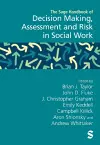
The Sage Handbook of Decision Making, Assessment and Risk in Social Work
7 contributors - Hardback
£135.00
Brian J Taylor, PhD, is Emeritus Professor of Social Work at Ulster University, Northern Ireland. Professionally qualified in social work and teaching, he spent 10 years as a practitioner and manager, and then 15 years in training and organisation development in health and social care before joining the University. Brian was founder and principal organiser of the biennial conference series: Decisions, Assessment, Risk and Evidence in Social Work, 2010-2022. He has taught, researched and published on these topics, including being author on over 100 peer-reviewed journal articles. He has supervised about 15 PhD students to completion, including some jointly with colleagues in communication studies, health care, psychology, youth and community work, law and computer science. Brian is a Fellow of the UK Academy of Social Sciences; honorary Senior Fellow of the School for Social Care Research at the National Institute for Health Research, London; and honorary Associate of the Harding Centre for Risk Literacy at the Max Planck Institute for Human Development, Berlin. He was a founder member of the Board of the European Social Work Research Association (ESWRA), and founder-Convenor of the ESWRA Decisions, Assessment and Risk Special Interest Group. John D Fluke, PhD, is Associate Director for Systems Research and Evaluation at the Kempe Center with appointments as Professor in the Department of Pediatrics at the University of Colorado School of Medicine, USA, and the Department of Epidemiology at the Colorado School of Public Health. His research focuses on child protection decision making and child maltreatment epidemiology. He is known internationally for his research involving child welfare administrative data analysis, workload and costing, and performance and outcome measurement for children and family services. For the US government as well as local governments, foundations, and international entities he has been PI or key staff for numerous projects. He participates in ongoing international efforts to improve the global capacity to understand the epidemiology of child maltreatment. He is the author or co-author of many peer reviewed publications, as well as numerous edited books, book chapters and reports. J. Christopher Graham, PhD, is a Senior Researcher in Child Welfare at the Washington State Department of Children, Youth, and Families (DCYF), Office of Innovation, Alignment, and Accountability. Dr. Graham holds a Doctoral Degree in Social Psychology from the University of Texas at Austin, USA. He has specialized in caseworker decision making, program evaluation, and performance monitoring for agencies working with vulnerable children, youth, and families, and is the author of numerous reports, scholarly articles, and some book chapters in the field of child welfare. Emily Keddell, PhD, is an Associate Professor in Social and Community Work at the University of Otago – Te Whare Wānanga o Otago. Her research focusses on child protection systems, specifically social inequities affecting system contact and experience, decision-making variability, knowledge interpretation in practice, the use of algorithmic decision tools, and the politics of state intervention in family life. She is a founding member of the Reimagining Social Work blog, an associate editor of Qualitative Social Work, and a member of the editorial collective of the journal Aotearoa New Zealand Social Work. Her work highlights issues of rights, equity and justice within child protection systems. Campbell Killick, PhD, is Lecturer in Social Work at Ulster University, Northern Ireland, where he teaches assessment and decision making on undergraduate (qualifying social work) courses and post-qualifying, post-graduate courses. He is Course Director for the MSc in Research Methods for social workers, service users, carers and others involved in social work services. Campbell’s research focuses on professional decision making particularly in relation to the abuse of children and adults. Campbell is Co-Founder and Deputy Convenor of the Decisions, Assessment and Risk Special Interest Group (DARSIG) of the European Social Work Research Association and Coordinator of Ulster University’s DARES initiative which supports research, teaching and organisation development for social work in relation to decision-making, assessment, risk and the use of evidence to inform practice and management of services. He is co-author of ‘Assessment, Risk and Decision Making in Social Work’ published by Sage. Aron Shlonsky, PhD, is Professor and Head of Department (Social Work) at Monash University School of Primary and Allied Health Care. He is known for his work in child and youth services, particularly in the generation, synthesis and implementation of evidence to inform practice and policy in the child and family services field. He has authored and co-authored over 100 other books, peer-reviewed articles and government reports in the child protection and family services areas including decision-making and risk assessment in child welfare, youth justice and domestic violence services, the predictors and effects of sibling separation in foster care, issues surrounding kinship foster care, and the teaching and implementation of evidence-informed practice. Andrew Whittaker, PhD, is Professor of Social Work Research at London South Bank University, England, where he is head of the Risk Resilience and Expert Decision Making (RRED) research group. His research on risk and decision making has ranged from ethnographic to randomised controlled trial research designs. Andrew recently completed a review of professional decision making for a child death inquiry in Queensland, Australia. He is the Convenor of the Decisions, Assessment and Risk Special Interest Group (DARSIG) of the European Social Work Research Association. DARSIG is the main European network for researchers in the field of assessment, risk and decision making in social work, with more than 80 members in over 20 countries. Andrew is Editor of the Journal of Social Work Practice.